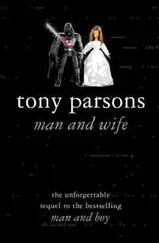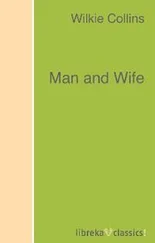Уилки Коллинз - Man and Wife
Здесь есть возможность читать онлайн «Уилки Коллинз - Man and Wife» весь текст электронной книги совершенно бесплатно (целиком полную версию без сокращений). В некоторых случаях можно слушать аудио, скачать через торрент в формате fb2 и присутствует краткое содержание. Год выпуска: 2006, Жанр: Классическая проза, на английском языке. Описание произведения, (предисловие) а так же отзывы посетителей доступны на портале библиотеки ЛибКат.
- Название:Man and Wife
- Автор:
- Жанр:
- Год:2006
- ISBN:нет данных
- Рейтинг книги:3 / 5. Голосов: 1
-
Избранное:Добавить в избранное
- Отзывы:
-
Ваша оценка:
- 60
- 1
- 2
- 3
- 4
- 5
Man and Wife: краткое содержание, описание и аннотация
Предлагаем к чтению аннотацию, описание, краткое содержание или предисловие (зависит от того, что написал сам автор книги «Man and Wife»). Если вы не нашли необходимую информацию о книге — напишите в комментариях, мы постараемся отыскать её.
Man and Wife — читать онлайн бесплатно полную книгу (весь текст) целиком
Ниже представлен текст книги, разбитый по страницам. Система сохранения места последней прочитанной страницы, позволяет с удобством читать онлайн бесплатно книгу «Man and Wife», без необходимости каждый раз заново искать на чём Вы остановились. Поставьте закладку, и сможете в любой момент перейти на страницу, на которой закончили чтение.
Интервал:
Закладка:
Even Geoffrey was startled, when he found himself met by a sudden necessity for acting on his own decision. Anne knew where his brother lived. Suppose Anne (not knowing where else to find him) appeared at his brother’s house, and claimed him in the presence of Mrs. Glenarm? He gave orders to have the messenger kept waiting, and said he would send back a written reply.
“From Craig Fernie?” asked Arnold, pointing to the letter in his friend’s hand.
Geoffrey looked up with a frown. He had just opened his lips to answer that ill-timed reference to Anne, in no very friendly terms, when a voice, calling to Arnold from the lawn outside, announced the appearance of a third person in the library, and warned the two gentlemen that their private interview was at an end.
CHAPTER THE EIGHTEENTH.
NEARER STILL.
BLANCHE stepped lightly into the room, through one of the open French windows.
“What are you doing here?” she said to Arnold.
“Nothing. I was just going to look for you in the garden.”
“The garden is insufferable, this morning.” Saying those words, she fanned herself with her handkerchief, and noticed Geoffrey’s presence in the room with a look of very thinly-concealed annoyance at the discovery. “Wait till I am married!” she thought. “Mr. Delamayn will be cleverer than I take him to be, if he gets much of his friend’s company then! ”
“A trifle too hot—eh?” said Geoffrey, seeing her eyes fixed on him, and supposing that he was expected to say something.
Having performed that duty he walked away without waiting for a reply; and seated himself with his letter, at one of the writing-tables in the library.
“Sir Patrick is quite right about the young men of the present day,” said Blanche, turning to Arnold. “Here is this one asks me a question, and doesn’t wait for an answer. There are three more of them, out in the garden, who have been talking of nothing, for the last hour, but the pedigrees of horses and the muscles of men. When we are married, Arnold, don’t present any of your male friends to me, unless they have turned fifty. What shall we do till luncheon-time? It’s cool and quiet in here among the books. I want a mild excitement—and I have got absolutely nothing to do. Suppose you read me some poetry?”
“While he is here?” asked Arnold, pointing to the personified antithesis of poetry—otherwise to Geoffrey, seated with his back to them at the farther end of the library.
“Pooh!” said Blanche. “There’s only an animal in the room. We needn’t mind him! ”
“I say!” exclaimed Arnold. “You’re as bitter, this morning, as Sir Patrick himself. What will you say to Me when we are married if you talk in that way of my friend?”
Blanche stole her hand into Arnold’s hand and gave it a little significant squeeze. “I shall always be nice to you, ” she whispered—with a look that contained a host of pretty promises in itself. Arnold returned the look (Geoffrey was unquestionably in the way!). Their eyes met tenderly (why couldn’t the great awkward brute write his letters somewhere else?). With a faint little sigh, Blanche dropped resignedly into one of the comfortable arm-chairs—and asked once more for “some poetry,” in a voice that faltered softly, and with a color that was brighter than usual.
“Whose poetry am I to read?” inquired Arnold.
“Any body’s,” said Blanche. “This is another of my impulses. I am dying for some poetry. I don’t know whose poetry. And I don’t know why.”
Arnold went straight to the nearest book-shelf, and took down the first volume that his hand lighted on—a solid quarto, bound in sober brown.
“Well?” asked Blanche. “What have you found?”
Arnold opened the volume, and conscientiously read the title exactly as it stood:
“Paradise Lost. A Poem. By John Milton.”
“I have never read Milton,” said Blanche. “Have you?”
“No.”
“Another instance of sympathy between us. No educated person ought to be ignorant of Milton. Let us be educated persons. Please begin.”
“At the beginning?”
“Of course! Stop! You musn’t sit all that way off—you must sit where I can look at you. My attention wanders if I don’t look at people while they read.”
Arnold took a stool at Blanche’s feet, and opened the “First Book” of Paradise Lost. His “system” as a reader of blank verse was simplicity itself. In poetry we are some of us (as many living poets can testify) all for sound; and some of us (as few living poets can testify) all for sense. Arnold was for sound. He ended every line inexorably with a full stop; and he got on to his full stop as fast as the inevitable impediment of the words would let him. He began:
“Of Man’s first disobedience and the fruit.
Of that forbidden tree whose mortal taste.
Brought death into the world and all our woe.
With loss of Eden till one greater Man.
Restore us and regain the blissful seat.
Sing heavenly Muse—”
“Beautiful!” said Blanche. “What a shame it seems to have had Milton all this time in the library and never to have read him yet! We will have Mornings with Milton, Arnold. He seems long; but we are both young, and we may live to get to the end of him. Do you know dear, now I look at you again, you don’t seem to have come back to Windygates in good spirits.”
“Don’t I? I can’t account for it.”
“I can. It’s sympathy with Me. I am out of spirits too.”
“You!”
“Yes. After what I saw at Craig Fernie, I grow more and more uneasy about Anne. You will understand that, I am sure, after what I told you this morning?”
Arnold looked back, in a violent hurry, from Blanche to Milton. That renewed reference to events at Craig Fernie was a renewed reproach to him for his conduct at the inn. He attempted to silence her by pointing to Geoffrey.
“Don’t forget,” he whispered, “that there is somebody in the room besides ourselves.”
Blanche shrugged her shoulders contemptuously.
“What does he matter?” she asked. “What does he know or care about Anne?”
There was only one other chance of diverting her from the delicate subject. Arnold went on reading headlong, two lines in advance of the place at which he had left off, with more sound and less sense than ever:
“In the beginning how the heavens and earth.
Rose out of Chaos or if Sion hill—”
At “Sion hill,” Blanche interrupted him again.
“Do wait a little, Arnold. I can’t have Milton crammed down my throat in that way. Besides I had something to say. Did I tell you that I consulted my uncle about Anne? I don’t think I did. I caught him alone in this very room. I told him all I have told you. I showed him Anne’s letter. And I said, ‘What do you think?’ He took a little time (and a great deal of snuff) before he would say what he thought. When he did speak, he told me I might quite possibly be right in suspecting Anne’s husband to be a very abominable person. His keeping himself out of my way was (just as I thought) a suspicious circumstance, to begin with. And then there was the sudden extinguishing of the candles, when I first went in. I thought (and Mrs. Inchbare thought) it was done by the wind. Sir Patrick suspects it was done by the horrid man himself, to prevent me from seeing him when I entered the room. I am firmly persuaded Sir Patrick is right. What do you think?”
“I think we had better go on,” said Arnold, with his head down over his book. “We seem to be forgetting Milton.”
“How you do worry about Milton! That last bit wasn’t as interesting as the other. Is there any love in Paradise Lost?”
Читать дальшеИнтервал:
Закладка:
Похожие книги на «Man and Wife»
Представляем Вашему вниманию похожие книги на «Man and Wife» списком для выбора. Мы отобрали схожую по названию и смыслу литературу в надежде предоставить читателям больше вариантов отыскать новые, интересные, ещё непрочитанные произведения.
Обсуждение, отзывы о книге «Man and Wife» и просто собственные мнения читателей. Оставьте ваши комментарии, напишите, что Вы думаете о произведении, его смысле или главных героях. Укажите что конкретно понравилось, а что нет, и почему Вы так считаете.








